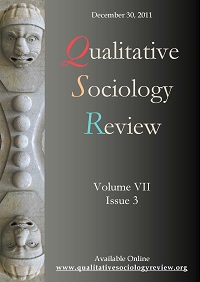Narrating Memory: Weighing up the Testimony
DOI:
https://doi.org/10.18778/1733-8077.7.3.02Keywords:
Memory, Experience, Consciousness, Life-world, Re-membering, Intersubjectivity, African National Congress, Circumcision, Robben IslandAbstract
Memory is the ability to store, maintain and recall information and experiences. Although predominantly an individual attribute, memory coincides with the life-world, with consciousness and with the ability to define reality – all of which are shared with others. When analysing narratives the sociologist needs to situate individual memory within its broader context. The article follows the argument that individuals acquire their memories within a broader social context. They also recall and localise their memories within a broader social context. This article interprets a remarkable testimony: the story of a former political prisoner who circumcised a large number of young fellow inmates in the notorious prison on Robben Island, South Africa, during the period of Nelson Mandela‟s incarceration. The article relates the narrative in question to the life-world of the narrator and to his experiences whilst serving his 18-year prison sentence. It reflects on the epistemological questions regarding memories. Memory as recollection, as reconstruction of events and information, and as process of re-membering come under the spotlight. Narratives that are often repeated start taking on a life of their own – particularly in the case of trauma memories. When analysing these narratives, the sociologist needs to distinguish between objective markers and subjective interpretation. Memory does not constitute pure recall by the individual. The article illustrates the effect of intersubjective and collective factors on the process of remembering. It calls for a reflexive process to identify, re-interpret and unpack the process of remembering.
Downloads
References
Berger, Peter L. and Brigitte Berger. 1972. Sociology. A Biographical Approach. New York: Basic Books.
Google Scholar
Bourdieu, Pierre. 1977. Outline of a Theory of Practice. Cambridge: Cambridge University Press.
Google Scholar
DOI: https://doi.org/10.1017/CBO9780511812507
Bruner, Jerome. 1987. “Life as Narrative.” Social Research 54(1):11-32.
Google Scholar
Burke, Peter. 1989. “History as Social Memory.” Pp. 97-113 in Memory, History, Culture, Mind, edited by T. Butler. New York: Blackwell.
Google Scholar
Coetzee, Jan K. 2000. Plain Tales from Robben Island. Pretoria: Van Schaik Publishers.
Google Scholar
Coetzee, Jan K., Lynda Gilfillan and Otakar Hulec. 2004. Fallen Walls: Prisoners of Conscience in South Africa and Czechoslovakia. New Brunswick, NJ: Transaction Publishers.
Google Scholar
Coetzee, Jan K. and Asta Rau. 2009. “Narrating Trauma and Suffering: Towards Understanding Intersubjectively Constituted Memory.” Forum: Qualitative Social Research 10(2), Art 14. Retrieved December 4, 2011 http://www.qualitative-research.net/index.php/fqs/article/view/1282/2756
Google Scholar
Fentress, James and Chris Wickham. 1992. Social Memory. Oxford: Blackwell.
Google Scholar
Halbwachs, Maurice. 1992. On Collective Memory. Chicago: University of Chicago Press.
Google Scholar
Havel, Václav. 1990. “History of a Public Enemy.” New York Review of Books, May 31, 37(9):36-44. Retrieved December 4, 2011 http://www.nybooks.com/articles/archives/1990/may/31/history-of-a-public-enemy/?pagination=false
Google Scholar
Lauer, Quentin. 1965. Phenomenology: Its Genesis and Prospects. New York: Harper.
Google Scholar
Levy, Daniel and Natan Sznaider. 2006. “The Politics of Commemoration: the Holocaust, Memory and Trauma.” Pp. 289-304 in Handbook of Contemporary European Social Theory, edited by G. Delanty. Oxford: Routledge.
Google Scholar
DOI: https://doi.org/10.4324/9780203086476-26
Luijpen, William A. 1966. Phenomenology and Humanism: A Primer in Existential Phenomenology. Pittsburgh: Duquesne University Press.
Google Scholar
Olick, Jeffrey K. 1999. “Collective Memory: The Two Cultures.” Sociological Theory 17(3):333-348.
Google Scholar
DOI: https://doi.org/10.1111/0735-2751.00083
Olick, Jeffrey K. (ed.). 2003. States of Memory: Continuities, Conflicts, and Transformations in National Retrospection. Durham: Duke University Press.
Google Scholar
DOI: https://doi.org/10.1215/9780822384687
Pachter, Marc. 1981. Telling Lives. The Biographer’s Art. Philadelphia, PA: Pennsylvania Press.
Google Scholar
Perks, Robert and Alistair Thompson (eds.). 1998. The Oral History Reader. London: Routledge.
Google Scholar
Podgórecki, Adam and Maria Łoś. 1979. Multi-dimensional Sociology. London: Routledge and Kegan Paul.
Google Scholar
Radstone, Susannah. 2000. Memory and Methodology. Oxford: Berg.
Google Scholar
Rogers, Mary F. 1983. Sociology, Ethnomethodology, and Experience. Cambridge: Cambridge University Press.
Google Scholar
Schacter, Daniel, L. 1996. Searching for Memory: The Brain, the Mind and the Past. New York: Basic Books.
Google Scholar
Suttner, Raymond. 2005. “Masculinities in the African National Congress-led Liberation Movement: The Underground Period.” KLEIO 37(1):71-106. Retrieved December 4, 2011 http://www.tandfonline.com/toc/rahr19/37/1
Google Scholar
DOI: https://doi.org/10.1080/00232080585380051a
Downloads
Published
How to Cite
Issue
Section
License

This work is licensed under a Creative Commons Attribution-NonCommercial-NoDerivatives 4.0 International License.











